From July 5 to 7, 2024, ten undergraduate students from the School of International Studies, Peking University (SIS, PKU) traveled to Waseda University in Japan to participate in the “CAMPUS Asia” 2024 Social Innovation Forum, together with peers from China, Korea, and Singapore.
The theme of the forum was “Demographic Changes in Asia and Their Social Impact”, focusing on the opportunities and challenges brought by demographic transformation. It aimed to inspire students to envision future societies through problem-solving approaches. The forum included three main components: community exploration, expert lectures, and project design. Over 50 faculty and students from Waseda University (Japan), Korea University (South Korea), Nanyang Technological University (Singapore), and Peking University (China) took part. This year’s forum was hosted by Waseda University as the rotating organizer.
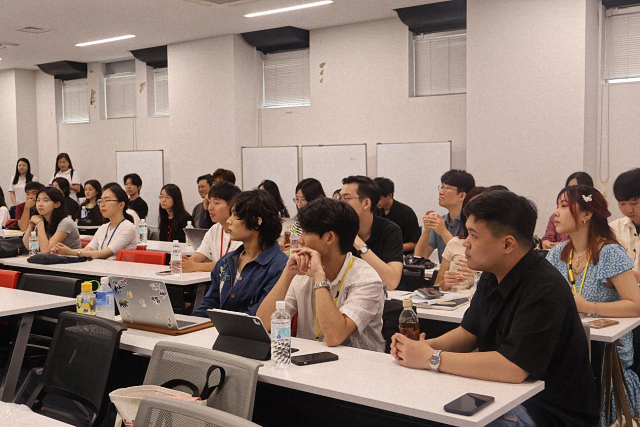
Forum in session
Exploring Communities, Experiencing Multiculturalism
During the forum, students engaged in two rounds of community exploration.
The first exploration sent student groups to Toyama Apartment, Takadanobaba, Kagurazaka, and Kishibojin Temple, all representative communities in Tokyo, to learn about the integration of multiculturalism, historical heritage, and modern development.
The second exploration focused on the Shin-Okubo area, a district known for its cultural intersections and large immigrant and labor populations. This experience helped students to better understand the realities and challenges of cultural integration in Tokyo, the role of immigrant communities in urban development, and inspired them to reflect on practices of social innovation in multicultural contexts.
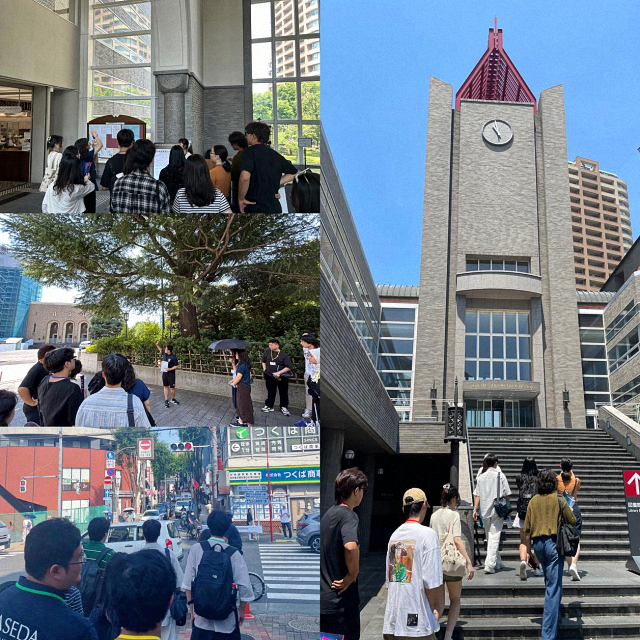
Students on community exploration
Expert Lectures and Project Design
Beyond field visits, students also attended expert lectures. Mr. Shigeyuki Yamamoto, head of the local volunteer group Kyōjūkon in Shin-Okubo, gave a talk on community planning and development, tracing the growth of immigrant populations in Shinjuku and the transformation of Shin-Okubo into a “tourist destination.”
Associate Professor Yoshiko Koyama from the Faculty of Social Sciences, Waseda University, guided students in project design, introducing tools such as Reverse Engineering and the Five Whys. These methods helped students transform their observations of aging societies and challenges in multicultural integration into drivers for incubating social innovation projects.
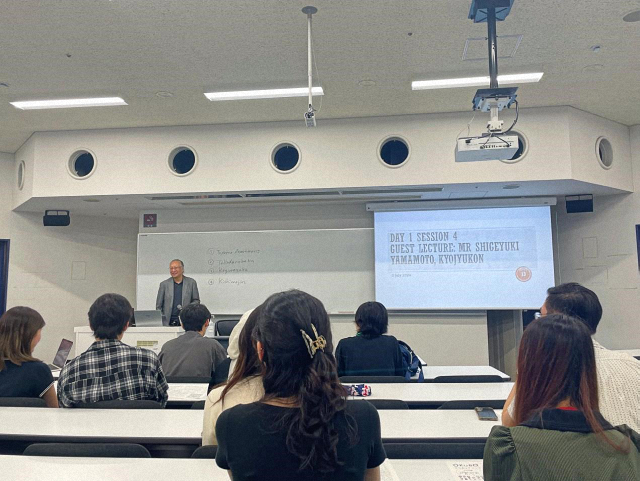
Expert lecture
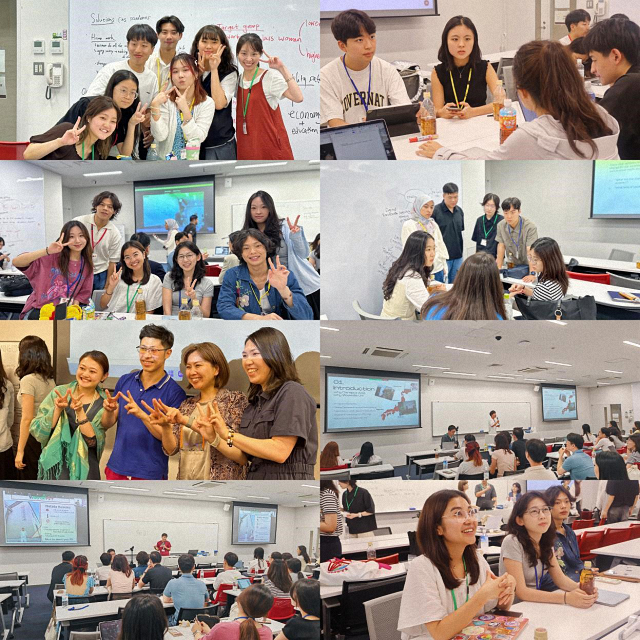
Project design and discussion
Showcasing Innovation and Exchange
On the final day, students from different universities engaged in group discussions, project design, and presentations. Based on issues observed during community exploration, the groups proposed a range of dynamic solutions. In particular, the students’ innovative thinking in addressing aging and multicultural integration demonstrated the creativity and sense of responsibility of the young generation in East Asia.
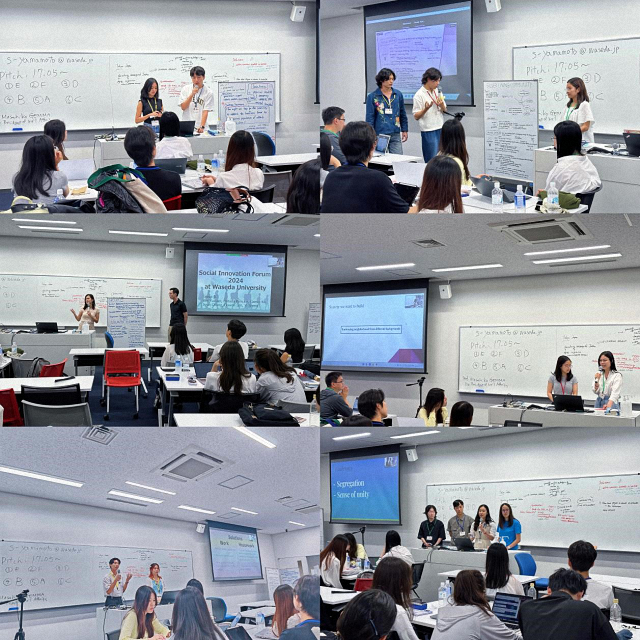
Project presentation and exchange

Faculty feedback
This forum not only broadened students’ international horizons and provided valuable opportunities for cross-cultural exchange, but also enhanced their understanding of global social issues and their ability to respond. It laid a solid foundation for future international cooperation and social development.
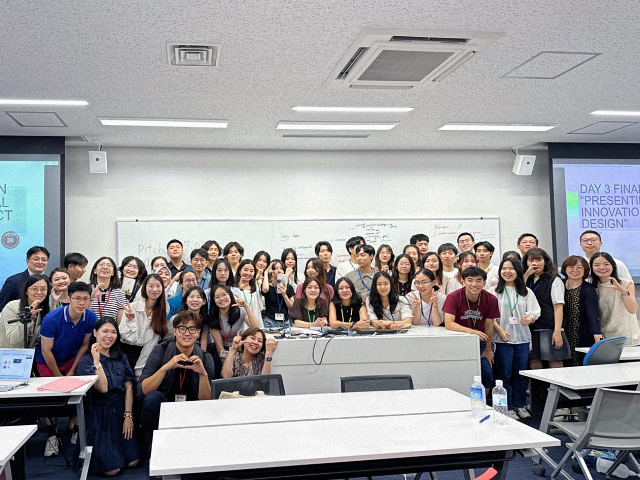
Group photo of students and faculty from the four universities
Written by: Shen Nuo
Photos by: Shen Nuo, Xu Jiaqi
Edited by: Chen Fang, Xu Jiaqi
Student Reflections
Shen Nuo (Undergraduate, Class of 2021, International Politics)
Aging and multicultural integration are common challenges faced by many countries today. What I observed in Tokyo over the past few days provided a glimpse into the realities of Japanese society, while discussions with my teammates deepened my understanding of other countries. As Professor Koyama emphasized, answers to social challenges can often be found in individuals’ everyday lives—each person has their own concerns and agency. For me, participating in the CAMPUS Asia Summer Forum was a truly precious experience: I gained knowledge, built friendships, and encountered richer perspectives of society and culture—this is precisely what I most enjoy in my study and practice of international relations.
Sun Zhiyuan (Undergraduate, Class of 2021, International Organizations and Public Policy)
I was delighted to once again join the “CAMPUS Asia” Social Innovation Forum and return to the beautiful campus of Waseda University. Waseda has witnessed my growth and progress within the CAMPUS Asia program, and I have also seen the program itself thrive. With more students participating in Asian youth exchanges, we build mutual understanding through dialogue and deepen friendships through interaction. For me, these are unforgettable memories to last a lifetime.
Xia Yuwei (Undergraduate, Class of 2022, International Politics)
If I were to summarize this experience in one phrase, it would be “seeking common ground while preserving differences.” Students from four Asian countries discovered similarities and differences during long walks across Tokyo, in casual conversations, and in collaborative work. In group discussions, I learned about social realities I had never considered before, such as the prevalence of domestic helpers in Singapore, Japanese traditional marriage views resisting highly educated women, and the intensity of educational competition in Korea. We are so different, yet so alike.
Lin Yuanzhe (Undergraduate, Class of 2022, International Politics)
This activity gave me a deeper understanding of my own abilities and values. I realized I could not only lighten the atmosphere between Chinese and Korean students, but also serve as a cultural bridge. I also gained valuable experience from others, especially in discussions, where I came to appreciate how asking the right questions can effectively drive dialogue forward. The forum improved my communication and social skills, and boosted my confidence in cross-cultural exchange. In the future, I hope to continue playing a bridging role and foster more international friendships and cooperation.
Liu Peilin (Undergraduate, Class of 2022, International Politics)
For me, the key word of this experience is “hope.” Whatever kind of community or future we seek to build, the standard should be whether it brings us hope and joy. While social development provides higher incomes and more convenient tools, people are often losing confidence in life and the future. Today’s frequent talk of “exhaustion” may reflect more of a spiritual emptiness. Perhaps, instead of only material improvements, we need to reflect on why people lose hope. Rediscovering hope is also the process of building the future.
Lang Zheng (Undergraduate, Class of 2023, International Politics)
I gained a lot from the CAMPUS Asia Summer Forum. On the first day, the ice-breaking activity of “silent birthday sorting” showed me the necessity of keeping communication channels open—in any form, “making one’s voice heard” is essential for others to understand us, be it for a nation or a civilization. Over two days of field studies, I gained a rough understanding of traditional Japanese communities, reminiscent of sociologist Fei Xiaotong’s notion of the “acquaintance society” in rural China, inviting comparison. In Shin-Okubo’s development, cultural integration and dialogue stand out, while the Mazu Temple showed me how Chinese culture has taken root in Tokyo. Of course, behind cultural exchanges lie government planning and guidance. On the final day, despite differences in nationality, language, and culture, we worked together to design an ideal society based on issues we observed. Through this process, we not only learned about social and cultural differences, but also strengthened cultural confidence. The intellectual exchange with outstanding students from across Asia broadened my vision and brought rich rewards.
Wei Yuxuan (Undergraduate, International Politics)
The seminar-style discussions at Waseda University were unique and memorable. Every student was able to fully participate, while professors acted as guides. Solutions emerged from students themselves, who also had more opportunities to showcase creativity. I believe such small-class teaching designs for undergraduates are innovative and worth adopting.
Liao Minru (Undergraduate, International Relations)
This activity provided me with a rare opportunity to interact with students from Singapore, Japan, China, and Korea, improving my cross-cultural communication skills. Each student brought different backgrounds, perspectives, and language abilities, making our exchanges dynamic and interesting. Sometimes, we communicated through gestures or even relied on translation tools. I realized that beyond cultural differences, we share many similarities. We face common issues such as aging, low fertility, and multicultural challenges. Encouragingly, we all care deeply about these topics and share a vision for a better future—this, perhaps, is the true meaning of this exchange.
Yang Wanyi (Undergraduate, International Politics)
The CAMPUS Asia program at Waseda University was an unforgettable experience. During our visit to Shin-Okubo, we observed the community’s diversity and vitality: Buddhism, Catholicism, and Mazu culture coexist; Chinese, Thai, Korean, and Japanese cultures flourish. This revealed the possibilities of multicultural coexistence. Our group focused on addressing elderly loneliness, proposing solutions such as time banks and mutual-help systems to enhance community cohesion and seniors’ social lives. What impressed me most was the collaborative process of problem-solving with peers from different countries. Despite language and cultural barriers, through mutual understanding and joint effort, we successfully completed the task. This experience not only strengthened our teamwork skills but also deepened our appreciation of cross-cultural communication.
Xu Ziqi (Undergraduate, International Relations)
This study trip gave us the chance to explore Japanese society alongside peers from other countries. Every place we visited carried knowledge. We focused on sustainable social development, seeking ways to integrate global perspectives with local practices to build a more ideal, harmonious, and prosperous society. As a Waseda professor put it: “Let’s be collaborators instead of competitors, and make a bigger apple pie together rather than splitting a small one.”
Further Reading
The “CAMPUS Asia” program is jointly implemented by the governments of China, Japan, and South Korea, aiming to promote university-level exchanges and cooperation. In 2021, the program launched the “China–Japan–Korea + x” model. Within this framework, SIS, PKU collaborates with Waseda University, Korea University, and Nanyang Technological University in Singapore on undergraduate student exchange programs. In July 2023, SIS organized a delegation of more than ten undergraduates to attend the 2023 CAMPUS Asia Social Innovation Forum at Nanyang Technological University, Singapore.